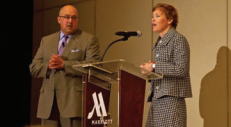Preamble:
As appropriate for a professor of media studies, Siva Vaidhyananthan used two Gene Hackman films to set his stage: The Conversation (1974) and Enemy of the State (1998). Although they were separated by 25 years, in both films Hackman portrays a surveillance expert focused on issues that seem to have foreshadowed the 2002 Patriot Act and our current concern with the National Security Agency’s surveillance of people.

Vaidhyananthan began the 2014 CSE annual meeting with an incisive examination of the phenomenon dubbed Big Data. His premise was that the mastering of big data (a term that came into use circa 2009) is the “magic wand for success in understanding the human condition” and might make our society financially and politically viable and healthy. However, the hyperbole and hubris of many have gotten in the way of that potential; Vaidhyananthan focused on two examples, Google Flu Trends and Big Data: A Revolution1 by Mayer-Schönberger and Cukier.
Google Flu Trends is an example of the company’s 20% projects. Employees are given time each week (20%) to focus on ideas of their own that might be tangential to or completely apart from their work assignments. The results sometimes come to fruition and are launched. That was the case with Google Flu Trends, which presumed to predict where an influenza outbreak was occurring (or might become worse) on the basis of people’s search patterns. Yet, when the Centers for Disease Control and Prevention followed up using real data, it found that what actually drove people’s searching wasn’t always symptoms of the flu but rather media coverage that a flu outbreak might occur. That result was not exactly what this big data solution intended.
What Vaidhyananthan notes in the work of Moyer-Schönberger and Cukier and of others proselytizing for big data is the “total absence of costs, winners and losers, doing it right, and a sense of politics”. In essence, he says that much of what has been said about big data makes no sense to him. He especially finds the book Social Physics,2 by Massachusetts Institute of Technology Professor Alex Pentland, amazing for its hubris. Pentland pontificates on the laws of social dynamics, which Vaidhyananthan deems shallow social determinism that is based on “found” vs “big” data. He explained that science is a constant process of failure, as has been experienced for 500 years, but there is no failure with found data. Thus, for Pentland, Chris Anderson3 before him (dubbed by Vaidhyananthan the “master of hyperbole”), and others, causation is irrelevant. All that matters is that we can predict things from data. Vaidhyananthan strongly disagrees. He believes that causality and theory still matter. He quoted the respected pollster Gallup as similarly noting that refinement is important: “More data is not necessarily better data”.
Found data only amplify and falsify and even yield false positives. Thus, it is critical for us to address this widespread ignorance by making sure that everyone learns basic statistics and computer science before graduating from high school. Those skills are needed if one is to be able to discuss science intelligently.
Vaidhyananthan closed his formal remarks with this comment: “The age of hyperbole and hubris is over. It is time for real science”.
Postscript:
There were several comments and questions for Vaidhyanathan, each prefaced by an accolade for one of the best keynotes in many years. During the Q&A period, he cited CNN as an example of everything that we do wrong with data today, its coverage mimicking how we believe that science and technology will solve our problems. He ended by asking the audience of publishing and editing professionals to answer this question: “What would a socially responsible journal look like?” He then listened again to vibrant applause from an attentive and appreciative audience, urging us, before he left the stage, to rent The Conversation.
References
- Mayer-Schönberger V and Cukier K. Big data: A revolution that will transform how we live, work, and think. Houghton Mifflin, Boston. 2014.
- Pentland, A. Social physics: How good ideas spread—The lessons from a new science. 2014.
- Anderson C. The end of theory: The data deluge makes the scientific method obsolete. Wired Magazine 16:07, accessed 23 June 2008.
